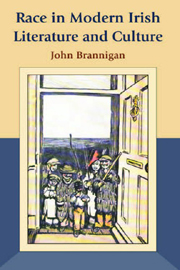Book contents
- Frontmatter
- Contents
- Illustrations
- Acknowledgements
- Introduction
- 1 1922, Ulysses, and the Irish Race Congress
- 2 Face Value: Racial Typology and Irish Modernism
- 3 ‘Aliens in Ireland’: Nation-building and the Ethics of Hospitality
- 4 ‘Ireland, and Black!’: The Cultural Politics of Racial Figuration
- Conclusion: Imagining the ‘New Hibernia’
- Bibliography
- Index
4 - ‘Ireland, and Black!’: The Cultural Politics of Racial Figuration
Published online by Cambridge University Press: 12 September 2012
- Frontmatter
- Contents
- Illustrations
- Acknowledgements
- Introduction
- 1 1922, Ulysses, and the Irish Race Congress
- 2 Face Value: Racial Typology and Irish Modernism
- 3 ‘Aliens in Ireland’: Nation-building and the Ethics of Hospitality
- 4 ‘Ireland, and Black!’: The Cultural Politics of Racial Figuration
- Conclusion: Imagining the ‘New Hibernia’
- Bibliography
- Index
Summary
‘Ireland, and black!’, the title for this chapter, comes from the ‘Occasional Discourse on the Negro Question’, published anonymously in 1849, and attributed to Thomas Carlyle, in which Carlyle forewarns that the consequences of emancipating the West Indies would be a ‘black Ireland – “free”, indeed, but an Ireland, and black!’ The punctuation of this phrase, ‘Ireland, and black!’, with caesura and exclamation registers the pathetic incongruity of the two terms, which are at the same time conjoined, and in each iteration in Carlyle's discourse the signification of black Ireland is marked textually or rhetorically as incompatible. Compared to ‘our own white or sallow Ireland, sluttishly starving, from age to age’, Carlyle says, ‘a negro Ireland’ would be beyond comprehension: ‘Imagination cannot fathom such an object; the belly of chaos never held the like’. Of course, Carlyle is using this impossible object, ‘black Ireland’, as a figure of inhuman depravity with which to attack philanthropic arguments about the West Indies, and the figure of ‘black Ireland’ is re-located to the Caribbean in ways which might lead us to pursue the same deconstructive reading as Colin Graham when he traces the tropological (and indeed tropical) flotation of ‘Ireland’ as a signifier in his essay, ‘Ireland, East of Atlantis’. One of the floating signifiers of ‘Ireland’ Graham reads in this essay is from John Mitchel's Jail Journal, published a year before Carlyle's text, in which Mitchel exclaims in surprise when discovering another island called ‘Ireland’ on his journey to Bermuda.
- Type
- Chapter
- Information
- Race in Modern Irish Literature and Culture , pp. 179 - 221Publisher: Edinburgh University PressPrint publication year: 2009

